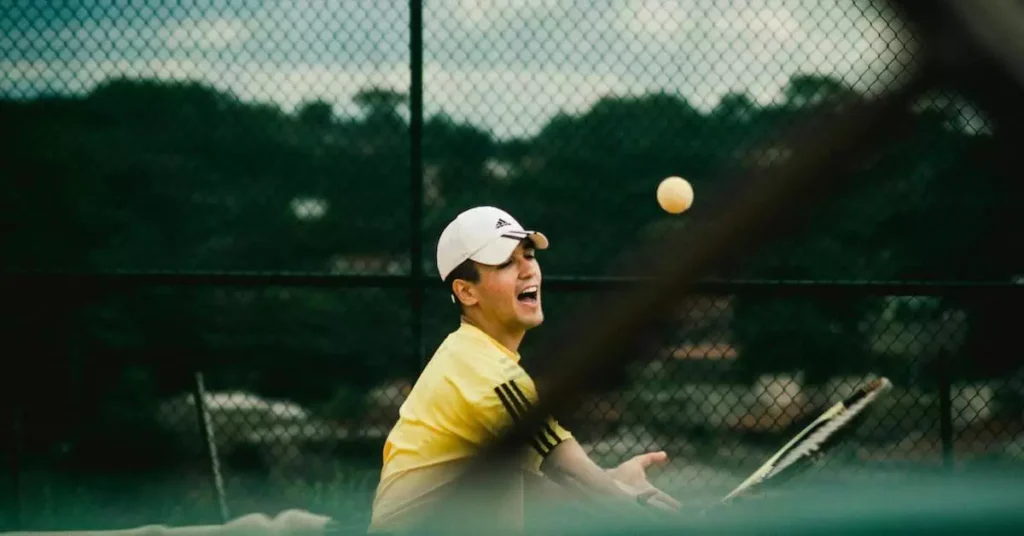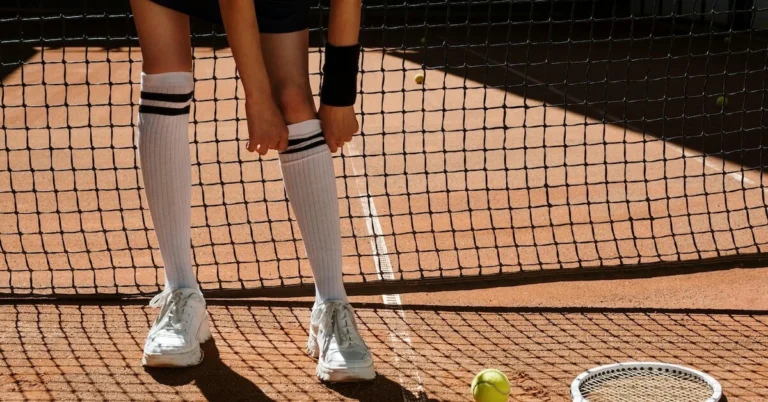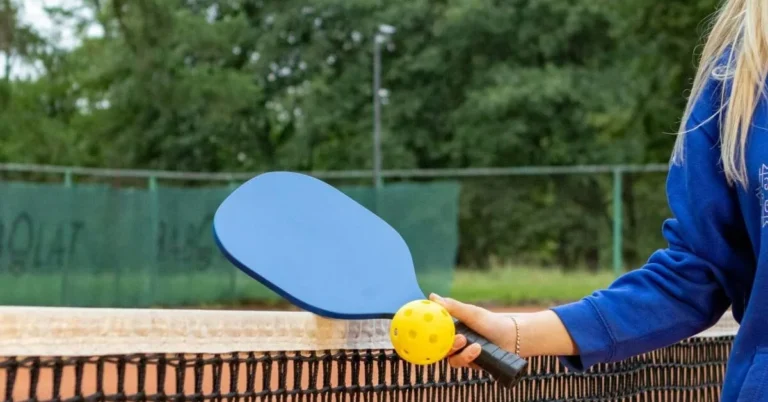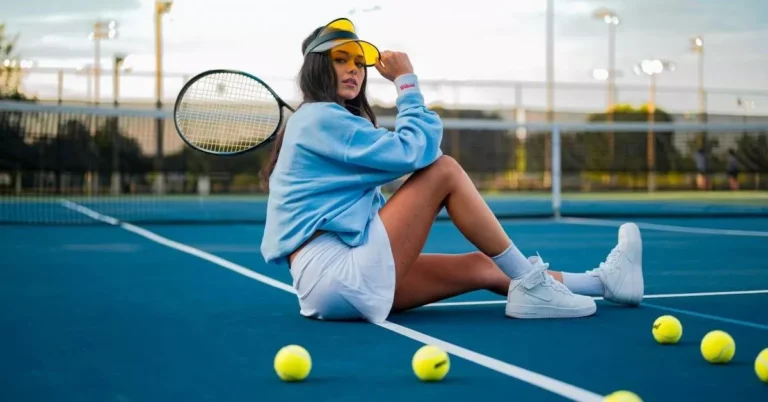Tennis is a sport that requires a lot of physical and mental strength, as well as precision and quick reflexes. One of the most distinctive features of tennis is the loud grunting or shouting noise that some players make when they hit the ball. If you’re new to tennis, you might be wondering why players shout while hitting the ball.
There are several reasons why tennis players grunt or shout while hitting the ball. One of the main reasons is that it helps them to generate more power and control on their shots. According to a study conducted by researchers at the University of Hawaii, grunting in tennis can increase a player’s hitting velocity by as much as 4.5%. The noise made during the grunt can also distract opponents, which can be advantageous for the player making the noise.
The Phenomenon of Grunting in Tennis
If you have ever watched a tennis match, you may have noticed that some players make loud noises while hitting the ball. This phenomenon is called grunting, and it has become a common practice in tennis, especially among professional players.
Grunting is a loud noise made by some tennis players while hitting their shots. It has been described as “shrieking” or “screaming” by some. The practice of grunting in tennis has been around for decades, but it has become more prevalent in recent years.
Many tennis players grunt when they hit the ball because it helps them to exhale more powerfully, which allows them to better coordinate their effort and generate greater power.
In addition to the physical benefits of grunting in tennis, there are also some psychological benefits. Grunting can help players to focus and stay calm under pressure. It can also intimidate opponents and disrupt their concentration.
Despite the benefits, not all tennis players grunt. Some players prefer to remain silent while hitting the ball, while others only grunt when hitting a harder shot or when they’re under pressure. It is a matter of personal preference and style.
Historical Context

Grunting in tennis has been a topic of debate for decades. While some find it distracting, others believe it helps players to perform better. The history of grunting in tennis dates back to the 1970s when players began to experiment with different ways of generating power in their shots.
One of the earliest and most famous grunters was Jimmy Connors. He was known for his loud grunting on the court and even earned the nickname “Jimbo the Screamer.” Martina Navratilova was another player who grunted loudly on the court, and her grunting was often criticized by opponents and fans alike.
However, it was Monica Seles who brought grunting to the forefront of tennis culture. Seles was a dominant player in the 1990s, and her grunting was one of the most distinctive aspects of her game. She grunted on every shot, and her opponents often found it difficult to concentrate.
Since then, grunting in tennis has become more common, with many players using it as a way to improve their game. Andre Agassi and Ivan Lendl were two players who used grunting to their advantage, and both were known for their powerful shots and loud grunts.
Famous Grunting Players
Tennis players who grunt while hitting the ball have been around for decades. Some of the most famous grunting players in history include:
Maria Sharapova
Maria Sharapova is perhaps the most well-known grunter in tennis history. Her grunts have been measured at over 100 decibels, which is louder than a motorcycle. Sharapova’s grunting has been the subject of controversy throughout her career, with some opponents and fans finding it distracting.
Rafael Nadal
Rafael Nadal is another player known for his grunting. His grunts are not as loud as Sharapova’s, but they are still noticeable. Nadal has said that he grunts because it helps him to focus and maintain his rhythm.
Serena Williams
Serena Williams is one of the most successful tennis players of all time, and she is also known for her grunting. Williams’ grunts are not as loud as Sharapova’s, but they are still audible. Williams has said that she grunts because it helps her to release tension and stay focused.
Venus Williams
Venus Williams, Serena’s older sister, is also known for her grunting. Venus’ grunts are not as loud as Serena’s, but they are still noticeable. Venus has said that she grunts because it helps her to generate power and control her breathing.
Victoria Azarenka
Victoria Azarenka is a former world number one player who is known for her loud grunting. Azarenka’s grunts have been measured at over 95 decibels, which is louder than a chainsaw. Azarenka has said that she grunts because it helps her to stay focused and generate power.
Aryna Sabalenka
Aryna Sabalenka is a rising star in women’s tennis who is also known for her grunting. Sabalenka’s grunts are among the loudest in the game, and she has been criticized by some opponents for being too loud. Sabalenka has said that she grunts because it helps her to generate power and stay focused.
Michelle Larcher de Brito
Michelle Larcher de Brito is a retired Portuguese tennis player who was known for her extremely loud grunting. Her grunts were measured at over 100 decibels, which is louder than a chainsaw. Larcher de Brito’s grunting was the subject of controversy throughout her career, with some opponents and fans finding it distracting.
Gustavo Kuerten
Gustavo Kuerten is a retired Brazilian tennis player who was known for his loud grunting. Kuerten’s grunts were not as loud as some of the other players on this list, but they were still noticeable. Kuerten has said that he grunted because it helped him to release tension and stay focused.
The Science Behind Grunting in Tennis
Have you ever wondered why tennis players make such loud noises when they hit the ball? While it may seem like an unnecessary distraction, there is actually a scientific reason behind it. In fact, grunting has been shown to have a significant impact on a player’s performance.
Power and Velocity
One of the main reasons players grunt is to increase their power and hitting velocity. According to a study published in the International Journal of Exercise Science, grunting in tennis can increase the velocity of a player’s serve by up to 4.9%. This is because grunting allows players to exhale more forcefully, which in turn increases the power of their shot.
Physiological Cost
However, there is a physiological cost to grunting as well. According to a physiologist at the University of Nebraska-Lincoln, grunting in tennis can increase a player’s heart rate and blood pressure, which can lead to fatigue over time. In fact, some players have been known to use grunting as a tactic to tire out their opponents.
Hitting the Ball
Another reason players grunt is to help them time their shots. As Nick Bollettieri, a renowned tennis coach, explains, grunting in tennis puts breathing and hitting the ball accurately in sync. This allows players to maintain their rhythm and muscle memory, which can be crucial in a high-pressure match.
Science
Overall, the science behind grunting is still not fully understood. While some studies have shown that it can be beneficial, others have suggested that it may be more of a psychological tactic than a physical one. Regardless of the reason, it is clear that grunting in tennis has become an integral part of the game, and it is unlikely to go away anytime soon.
Grunting and Performance
Grunting in tennis is a common phenomenon that is often associated with better performance. While some people find it annoying, others believe that it helps them focus and improve their rhythm and timing.
When you grunt, you create a sound that can help you focus on the ball and block out distractions. It can also help you maintain your rhythm and timing, which are crucial for hitting the ball accurately and with power. According to a study published in the Journal of Sports Science and Medicine, grunting can improve the timing of your groundstrokes and serve, which can lead to better performance on the court.
In addition to helping you focus and improve your rhythm and timing, grunting can also enhance your performance by making your shots more powerful. When you grunt, you engage your core muscles and increase your breathing rate, which can help you generate more power and hit the ball harder. This is especially true for serves, where the extra power generated by grunting can help you hit a faster and more accurate serve.
While some people believe that grunting is a form of gamesmanship or a way to distract opponents, there is no evidence to suggest that it is a performance-enhancing technique. In fact, some players find it distracting and may even request that their opponents stop grunting during the match.
The Role of Breathing in Grunting
When it comes to tennis, breathing plays a crucial role in the sport, not just for staying alive but also for enhancing performance. Tennis players grunt while hitting the ball because it helps them exhale forcefully and consistently, which in turn helps them maintain their breathing rhythm and control their shots.
Grunting is a technique that helps players to control their breathing and maintain their focus on the ball. It is believed that by exhaling forcefully, tennis players can control their shots and get into a rhythm that helps them to hit the ball with more power and accuracy. This is because exhaling forcefully helps to stabilize the core muscles, which are essential for generating power and maintaining balance during the shot.
Breathing techniques can also help tennis players to manage their physical exertion. Tennis is a physically demanding sport that requires players to move quickly and change direction frequently. By using breathing techniques, players can regulate their heart rate and manage their energy levels more effectively, which can help to reduce fatigue and improve performance.
Grunting as a Distraction
One of the reasons why tennis players grunt while hitting the ball is to distract their opponents. The noise can be so loud that it can interfere with an opponent’s concentration and timing, making it difficult for them to return the ball. This is especially true for players who are not used to playing against grunting opponents.
Research has shown that grunting can indeed be a distraction for opponents. According to a study published in the journal PLOS ONE, grunting can interfere with an opponent’s ability to predict the ball’s trajectory and speed, making it harder for them to anticipate where to position themselves on the court. This can give the grunting player an advantage, as they can hit the ball to areas of the court that their opponent is not expecting.
Some opponents may feel that grunting is a form of cheating or unsportsmanlike behavior. However, grunting is not considered to be against the rules of tennis, and many players argue that it is simply a part of the game. In fact, some players may even use grunting as a form of gamesmanship, using it to intimidate their opponents and gain a mental edge.
Grunting and Auditory Information
When tennis players hit the ball, they often make loud grunting sounds. These sounds can be distracting to opponents, but they may also serve a purpose for the player making them. One theory is that grunting in tennis can help players focus and generate more power on their shots.
However, some opponents argue that grunting can also mask important auditory information used by players as the racket strikes the ball. According to an article from iNews UK, “a well-timed grunt can mask important auditory information used by a player as the racket strikes the ball.” This information includes the sound of the ball being hit, which can provide clues about the ball’s trajectory, spin, and speed.
Research has shown that the sound of a tennis ball being hit can convey a great deal of information to players. For example, the pitch of the sound can indicate the height of the ball, while the intensity of the sound can indicate the speed and power of the shot. This information can be used by players to anticipate the ball’s trajectory and make adjustments to their positioning and swing.
While grunting may help players generate more power on their shots, it may also come at a cost. By masking auditory information, grunting may make it more difficult for players to anticipate the ball’s trajectory and make accurate shots. As a result, some opponents argue that grunting in tennis should be banned altogether, while others argue that it is a natural part of the sport.
Rules and Regulations
Tennis is a sport with a set of rules and regulations that must be followed by all players. The rules and regulations are set by the International Tennis Federation (ITF), which is responsible for overseeing the sport of tennis worldwide. The four Grand Slam tournaments, namely Wimbledon, Australian Open, US Open, and French Open, also have their own set of rules and regulations that are specific to their tournaments.
One of the most important rules in tennis is the fault rule. A fault is when a player fails to hit the ball over the net and into the opponent’s court. If a player commits a fault, the point is awarded to the opponent. A fault can also occur if the ball lands outside the boundaries of the court or hits the net and fails to go over.
Another important rule in tennis is the let rule. A let occurs when a serve hits the net and lands in the correct service box. If this happens, the serve is replayed without penalty. The umpire is responsible for making the call on whether a let has occurred.
Tennis players are also required to follow certain etiquette rules during play. Courtesy is expected, and players are expected to show respect for their opponents and the game. Players are not allowed to receive coaching during a match, and they are not allowed to use any electronic devices on court.
The role of the umpire is to ensure that the rules and regulations of the game are being followed. The umpire is responsible for making calls on faults, lets, and other infractions. They also have the authority to issue warnings, point penalties, and even disqualifications if necessary.
Grunting in Men vs Women
Grunting in tennis is a common practice and is used by both male and female players. However, it is more frequently associated with female players, and some argue that women’s grunts are louder and more distracting than men’s.
Research has shown that both male and female players grunt for similar reasons, such as increasing power and focus. However, studies have also found that female players tend to grunt more often and at a higher volume than male players. This could be due to the perception that grunting is a feminine behavior, leading female players to feel more comfortable doing it.
Another possible explanation for the difference in grunting in tennis between men and women is the physical differences between the two genders. Women tend to have smaller lung capacity than men, which could lead to a higher-pitched grunt. Additionally, women’s tennis matches tend to be longer than men’s matches, which means female players may have more opportunities to grunt throughout the match.
It is worth noting that grunting is not unique to tennis and is used in other sports such as martial arts and weightlifting. In these sports, both male and female athletes grunt for similar reasons, such as increasing power and focus.
Public Reaction to Grunting in Tennis
The public’s reaction to grunting in tennis has been mixed. Some spectators find it annoying and distracting, while others see it as a natural part of the game. According to Nick Bollettieri, a renowned tennis coach, “grunting is a natural part of the game and helps players focus and hit the ball with more power and accuracy“. He further explains that grunting puts breathing and hitting the ball accurately in sync, which improves players’ rhythm and breathing.
Louise Deeley, a sports psychologist, agrees with Bollettieri’s view on grunting. She says that “grunting helps players release tension and focus on their game“. Stacy Allaster, a former CEO of the WTA, also supports the use of grunting in tennis. She believes that “grunting is a natural part of the game and has been used by players for decades“.
However, not everyone is a fan of grunting in tennis. Bruce Lynne, a tennis coach, believes that “grunting is a distraction and takes away from the beauty of the sport“. Some spectators also find it annoying and distracting, and some have even called for a ban on grunting in tennis.
Despite the mixed opinions on grunting, it is still allowed in professional tennis. The WTA has rules in place that state that players can only be penalized for grunting if it is deemed excessive or disruptive. Overall, the public’s reaction to grunting in tennis is divided, with some seeing it as a natural part of the game and others finding it distracting and unnecessary.
FAQ
What is the purpose of grunting in tennis?
Grunting is a common practice in tennis and is used by players to enhance their performance. According to Takin Sports, grunting can help players enhance their focus and timing, increase power and effort, and reduce injury. Some players also use it as a mind game to distract their opponents. Grunting can also help players release tension and stress during a match.
Are there any rules against grunting in tennis?
There are no specific rules against grunting in tennis. However, the International Tennis Federation (ITF) has stated that excessive grunting can be considered a hindrance and can result in a warning or point penalty for the player. The ITF has also introduced a “grunt-o-meter” to measure the loudness of grunts during matches.
Do all tennis players grunt?
Not all tennis players grunt. Some players prefer to play in silence, while others only grunt occasionally. Grunting is more common in women’s tennis, with players like Monica Seles, Maria Sharapova, and Victoria Azarenka known for their loud grunts. However, some male players like Rafael Nadal and Novak Djokovic also grunt during matches.
Overall, grunting is a personal preference and can be beneficial to some players. However, excessive grunting can be distracting to opponents and spectators and can result in penalties from officials.
We’ve unveiled the secrets behind the captivating world of grunting in tennis, exploring the impact they have on the game and the players who master this art. Now, we want to hear from you!
What are your thoughts on the role of grunting in tennis? Have you ever tried it on the court, or do you have a favorite player whose grunts make the match even more thrilling for you? Share your experiences, insights, and opinions in the comments below.






